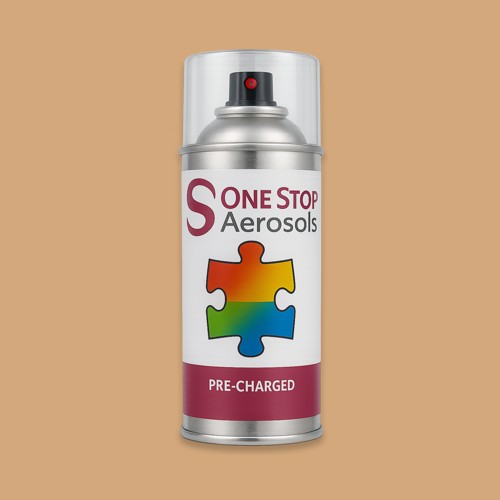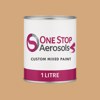- Landline -01908 991096
- Mobile -07793 053282
- Landline -01908 991096
- Mobile -07793 053282
Pantone 728 spray paint from £12.99 (excl. VAT) for a 400 ml custom mixed can.






| Format | Size | Coverage | Price |
|---|---|---|---|
| Aerosol Cans | |||
| 1K | 400 ml | 1.5 m2 | £12.99 |
| 2K | 400 ml | 1.5 m2 | £19.99 |
| 2K Air Dry | 400 ml | 1.5 m2 | £15.99 |
| Tins | |||
| 1K | 1 litre | 10 m2 | £39.99 |
| 1K | 2 litres | 20 m2 | £59.99 |
| 2K Air Dry | 1 litre | 10 m2 | £44.99 |
| 2K Air Dry | 2 litres | 20 m2 | £69.99 |
| Tester Pots | |||
| 1K | 60 ml | 0.5 m2 | £7.99 |
| 2K Air Dry | 60 ml | 0.5 m2 | £9.99 |
| 1K | 100 ml | 1 m2 | £9.99 |
| 2K Air Dry | 100 ml | 1 m2 | £11.99 |
| 1K | 250 ml | 2.5 m2 | £14.99 |
| 2K Air Dry | 250 ml | 2.5 m2 | £16.99 |
| Touch up Pens | |||
| 1K | 20 ml | 0.25 m2 | £7.99 |
| 2K Air Dry | 20 ml | 0.25 m2 | £9.99 |
Colour: Pantone 728
Product type: Custom mixed aerosols, tins & pots.
Brand: One Stop Aerosols
Product Code: 6297
Price: £7.99 – £69.99 + VAT
Availability: In Stock
RGB Colour Code: 211-168-124
Hexadecimal Colour Code: #D3A87C
30-day returns policy on all eligible faulty products.
Pantone 728 is part of the Pantone C Paint Colour Chart. Orders are batch mixed to specification using premium Lechler binders and colourants for repeatable colour across aerosols and tins.
Suitable for a broad range of substrates when used with the correct primer. Provides smooth application, reliable adhesion and durable colour stability.
Need guidance? Tap the icons beside Size, Paint Type and Gloss Level for quick help, or send us a message.
Cause: Contamination, glossy or un-keyed surface, wrong or no primer, moisture on the substrate.
Fix: Strip loose areas, degrease, abrade to a uniform key, and re-prime with a substrate-appropriate primer.
Prevent: Always degrease first, then abrade. Match primer to substrate, and respect drying times before topcoat.
Cause: Heavy passes, too far or too close spraying distance, low temp, poor flow, or insufficient flash-off.
Fix: After cure, denib and flat with fine abrasive, then recoat with lighter, even passes.
Prevent: Keep a steady distance, warm the can, apply light coats, and allow proper flash-off between coats.
Cause: Spraying too far away, fast pass speed, high airflow, or low temperature causing solvent to flash in the air.
Fix: Lightly denib, then apply a wetter pass at the correct distance and speed.
Prevent: Maintain consistent distance, overlap passes by one third, and avoid windy or very cold conditions.
Cause: Silicone, oil or wax contamination that repels the coating.
Fix: Stop, allow to dry, sand out affected areas, deep clean with a suitable degreaser, then re-prime and recoat.
Prevent: Keep the work area silicone free. Avoid furniture polishes and low-grade masking tapes that shed residue.
Cause: Uneven film build, inconsistent overlap, or recoating outside the recommended window.
Fix: After cure, lightly key the surface and apply one or two uniform coats within the specified recoat window.
Prevent: Use consistent pass speed and overlap, and let each coat flash-off before the next.
Cause: Excessive film per pass or lingering too long in one area.
Fix: Allow full cure, nib the defect level with fine abrasive, then recoat with lighter passes.
Prevent: Apply multiple light coats, keep the gun or can moving, and avoid trying to achieve full coverage in one pass.
Cause: Recoating too soon or too late, solvent attacking a sensitive base, or incompatible layers.
Fix: Allow to dry fully, sand back to a stable layer, apply a compatible primer, then recoat within the advised window.
Prevent: Observe recoat times, test compatibility on a small area, and avoid heavy wet coats over uncured layers.
Please note: our Pantone 728 aerosols, tin & pots are custom mixed and should be test-sprayed on a small, inconspicuous area before full application. We cannot accept responsibility for any colour difference once paint has been applied to your surfaces. If the colour is not accurate, please contact us to arrange a return.